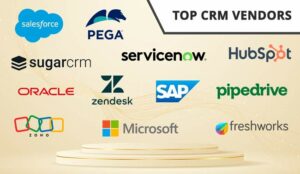The CRM landscape is evolving rapidly, driven by advances in AI, automation, and integration capabilities. Call Centre Helper looks at the leading CRM vendors set to dominate the market.
Top CRM Vendors for 2024
Salesforce
Salesforce continues to act as a leader in the CRM market with its extensive Customer 360 platform, which integrates sales, service, marketing, and commerce functionalities.
The platform’s AI capabilities, particularly Einstein AI, offer predictive analytics and intelligent automation, helping businesses enhance customer experiences and streamline operations.
Salesforce is also known for its scalability and customizability, making it suitable for enterprises of all sizes.
Its AppExchange marketplace offers a vast array of third-party applications, providing further integration possibilities.
Additionally, Salesforce provides industry-specific solutions, ensuring businesses receive tailored functionalities that meet their unique needs.
However…
Salesforce has been criticized for its complexity and high cost of implementation and ongoing management.
The extensive range of features can overwhelm new users, and the platform requires significant training and continuous support to leverage its full potential.
According to Gartner’s Magic Quadrant for the CRM Customer Engagement Center, some users also report aggressive sales tactics and frequent changes in account management contacts, which can complicate the customer relationship.
Microsoft Dynamics 365
Microsoft Dynamics 365 combines CRM and ERP capabilities, offering a comprehensive solution for managing customer relationships and business operations.
The platform integrates seamlessly with Microsoft Office, LinkedIn, and Teams, providing a unified business environment.
Dynamics 365 leverages AI-driven insights and predictive analytics to support data-driven decision-making. It is highly customizable, allowing businesses to tailor the platform to their specific workflows.
With robust analytics and deep integration within the Microsoft ecosystem, Dynamics 365 is ideal for businesses already invested in Microsoft products.
However…
Microsoft Dynamics 365 can be complex to navigate, and its licensing model is often seen as convoluted, potentially leading to higher-than-expected costs.
Some users report inconsistent customer support experiences and a steep learning curve.
Furthermore, certain advanced features require additional modules or integrations, which can add to the overall cost and complexity.
HubSpot
HubSpot is renowned for its user-friendly interface and comprehensive CRM suite, which includes both free and premium versions.
The platform is designed for ease of use and quick implementation, making it accessible to small and medium-sized businesses without extensive technical resources.
HubSpot offers a range of marketing automation tools, lead management features, and detailed analytics.
Its AI capabilities support creative marketing campaigns and efficient self-service solutions, enhancing overall customer engagement.
However…
While HubSpot is easy to use, its premium features can become expensive as businesses scale. Some users are said to find the reporting capabilities to be less robust compared to other enterprise-level CRM solutions.
It is also worth considering that the customization options, while generally sufficient for SMBs, may not meet the needs of larger organizations with more complex requirements.
Oracle NetSuite
Oracle NetSuite offers a powerful CRM solution integrated with ERP and e-commerce capabilities.
This unified platform provides a holistic view of business operations, combining CRM with financial management, ERP, and e-commerce functionalities.
NetSuite’s real-time analytics and dashboards enable businesses to make informed decisions swiftly.
Its scalability and comprehensive integration capabilities make it suitable for larger organizations with complex operational needs. The platform’s robust feature set supports extensive customization and flexibility.
However…
Oracle NetSuite can be costly to implement and maintain, particularly for smaller businesses.
Users often cite the need for extensive customization, which can require significant time and specialized skills.
Additionally, the platform’s interface is sometimes considered less intuitive compared to other CRM solutions, leading to a longer learning curve.
Zendesk
Zendesk excels in customer support and engagement, providing a suite of tools designed to improve customer service operations.
Known for its intuitive interface, Zendesk facilitates user adoption and ease of use. The platform integrates AI-driven features for sentiment analysis, task automation, and agent augmentation.
It supports omnichannel communication, including chat, email, and social media, ensuring a cohesive customer experience. Zendesk is particularly well suited for businesses looking to enhance their customer service capabilities.
However…
Zendesk’s customization options may not be sufficient for larger enterprises with complex needs.
Some users report that the platform’s advanced features require additional investments in third-party integrations.
On top of this, while Zendesk excels in customer support, it may not be as robust in other CRM functionalities like sales automation and marketing, limiting its appeal as an all-in-one solution.
SAP
SAP offers a range of CRM solutions tailored for different industries, with strong integration capabilities with its ERP systems.
SAP’s CRM solutions are designed for process-intensive industries such as manufacturing, retail, and services.
The platform integrates deeply with SAP ERP, providing a unified view of customer and business data.
SAP leverages AI for predictive analytics and detailed reporting, supporting data-driven decision-making. Its industry-specific solutions make it a robust choice for businesses with complex operational requirements.
However…
SAP CRM can be challenging to implement and configure, often requiring extensive professional services.
The platform’s complexity can result in a steep learning curve, and users may find it less flexible compared to other CRM solutions.
SAP’s licensing and pricing structure can be difficult to navigate, potentially leading to higher overall costs.
Freshworks
Freshworks combines CRM with deal management software, offering a suite of tools for small to mid-sized businesses.
The platform includes AI-based lead scoring, chatbots, and workflow automation, which enhance sales and customer service processes.
Freshworks is known for its quick deployment and user-friendly interface, featuring integrated messaging and voice communication tools to support seamless customer interactions.
This makes it an excellent option for businesses seeking efficient, scalable solutions.
However…
Freshworks relies heavily on third-party integrations to deliver a complete CRM experience, which can add to the overall cost and complexity.
Some users report dissatisfaction with the responsiveness of customer support. While the platform is feature-rich, it may lack the depth of customization and advanced functionalities required by larger enterprises.
SugarCRM
SugarCRM focuses on aligning sales, marketing, and service teams through AI and automation.
The platform uses AI to create personalized customer interactions and predictive analytics. It is highly customizable, allowing businesses to tailor the CRM to their specific needs.
SugarCRM’s robust app marketplace provides extended functionality through third-party integrations, making it a versatile tool for enhancing customer engagement through technology.
However…
SugarCRM’s user interface is sometimes considered less intuitive compared to other leading CRM platforms.
The platform can also be resource-intensive to customize and maintain, requiring specialized skills.
Some users find the reporting and analytics capabilities to be less advanced than those offered by competitors.
Pipedrive
Pipedrive offers an intuitive CRM platform that is particularly beneficial for sales teams. Its interactive pipeline management helps sales teams track leads and optimize sales processes.
Pipedrive automates repetitive tasks, enhancing sales productivity and efficiency. The platform integrates with various tools such as Slack, Zoom, and Quickbooks, ensuring a seamless workflow.
Pipedrive’s focus on sales pipeline management makes it a valuable tool for businesses prioritizing sales efficiency.
However…
While Pipedrive excels in sales pipeline management, it offers limited functionalities in areas like customer service and marketing automation.
This narrow focus can be a drawback for businesses seeking an all-encompassing CRM solution.
Additionally, some users report that the platform’s customization options are somewhat limited compared to more comprehensive CRM systems.
Zoho CRM
Zoho CRM is popular for its affordability and comprehensive feature set, making it suitable for small to medium businesses.
Zoho offers a range of features at competitive prices, making it accessible to businesses on a budget.
The platform integrates with other Zoho products and numerous third-party applications, providing flexibility and scalability.
Zoho CRM includes tools for remote support and field service management, enhancing operational efficiency.
This makes it an attractive option for businesses seeking cost-effective yet powerful CRM solutions.
However…
Zoho CRM’s customer support can sometimes be slow, and users may encounter issues with the responsiveness of the support team.
The platform, while feature-rich, may lack the advanced capabilities and customization options required by larger enterprises.
Integrating Zoho CRM with other systems can occasionally be challenging, requiring additional technical expertise.
Pega Systems
Pega Systems offers an all-in-one solution for customer relationship management, combining tools for customer service management, sales automation, and marketing.
Pega’s platform is built around a workflow automation core, incorporating AI-powered decisioning and automatic cross-workflow referencing.
This makes it particularly suitable for large enterprises with complex, non-linear, multithreaded process orchestration needs.
The platform’s depth and breadth of integrations support demanding bidirectional integration and application embedding requirements typical in very large enterprises.
However…
Pega Systems is known for its complexity and can be difficult to implement and customize without specialized skills.
The platform’s powerful features come with a steep learning curve, which can hinder user adoption.
Furthermore, Pega’s pricing structure can be high, potentially making it less accessible for smaller businesses.
ServiceNow
ServiceNow is recognized for its strong platform capabilities, providing advanced case management, work assignment, and issue resolution functionality.
ServiceNow CSM integrates well with commonly used systems and is supported by numerous global technology, implementation, and consulting partnerships.
The platform’s workflow automation and RPA abilities support complex issue resolution and back-end services.
ServiceNow offers industry-specific solutions, templates, and workflows, making it suitable for a variety of sectors including technology, telecommunications, government, and financial services.
However…
ServiceNow’s pricing and licensing models are often seen as complex and inflexible, which can be a barrier for some organizations.
The platform, while robust, may not be as intuitive as other CRM solutions, requiring significant training and support.
Some users also report that ServiceNow’s customer engagement features are less advanced compared to its competitors, particularly in terms of AI-driven functionalities and digital transformation capabilities.
Choosing the right CRM provider depends on your current business needs and future growth plans; each provider offers unique strengths and caters to different segments of the market.
While other providers are available, this review focuses on those consistently featured in major CRM vendor reports.
It is essential to evaluate these options based on specific business requirements to ensure you select a platform that not only meets your current needs but also scales effectively as your business evolves.
If you are looking for more top contact centre software vendors, read these articles next:
Author: James Groves
Reviewed by: Xander Freeman
Published On: 3rd Sep 2024 - Last modified: 4th Sep 2024
Read more about - Technology, Customer Relationship Management (CRM), James Groves, Top Story





































